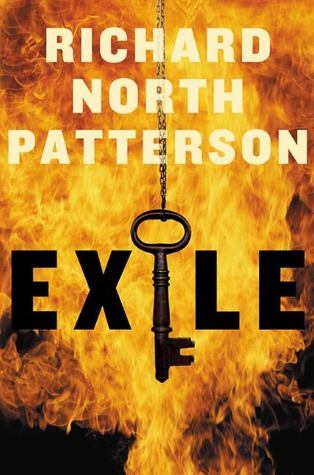Exile, by Richard North Patterson
Feb 12
2007

Richard North Patterson clearly put a hell of a lot of work into Exile. He spent countless hours on research, he did his best to be fair to both sides of an extraordinarily complicated issue, and he tried to minimize his own biases. Unfortunately, all that effort seems to have drained some of the storytelling juice out of him: Exile works beautifully as an informative, thoughtful guide to the horrifying Israeli/Palestinian conflict, but it’s not nearly as effective as a romance, mystery, or action novel.
The biggest problem with Exile is the central love story. David Wolfe is a 38-year-old lawyer with a nice Jewish fiancée and an up-and-coming political career, but his life changes after he gets a phone call from Hana Arif, the Palestinian woman with whom he had a secret affair in law school, thirteen years before. When a suicide bomber assassinates the prime minister of Israel during a visit to California and Hana is accused of masterminding the murder, David is irresistibly drawn to the case. He’s not sure that Hana (or her militant Palestinian husband) are as innocent as they claim to be, but he can’t abandon the woman who once meant so much to him, even if it costs him his fiancée and his career....
Yeah, right.
If Patterson had made David ten years younger, the character might have an excuse for indulging in such mawkish dramatics, but a man who’s almost forty and is willing to give up everything for the sake of his college girlfriend (who, it must be noted, was already engaged during their brief affair, and made no secret of her intention to go back home and marry her Palestinian fiancée) is a lot less plausible. David is supposed to come across as nobly self-sacrificing, but every interaction with Hana just makes him seem like a sap.
The legal thriller and action sequences were much more interesting, although Patterson’s painstaking efforts to illustrate both sides of the Israeli/Palestinian conflict caused some hiccups in the pacing. Just as I got into the rhythm of the legal battle, David takes a trip to Israel and the West Bank, which gave Patterson a chance to display the staggering amounts of research he must have done. It’s an impressive section of the book, but it’s tough to pick up steam again when David returns to the trial, and the end of the novel seems to come out of nowhere.
David and Hana’s interactions aside, I thought Exile was an informative, reasonably entertaining effort. (And if you’re the kind of person who really likes Casablanca, it’s possible that you won’t find their romance as nauseating as I did.) Reading a novel about Israel and Palestine was tough going—the hopelessness of the whole situation really puts a damper on any potential happy ending for the main characters—but Patterson does an admirable job of making the topic interesting and comprehensible.
The biggest problem with Exile is the central love story. David Wolfe is a 38-year-old lawyer with a nice Jewish fiancée and an up-and-coming political career, but his life changes after he gets a phone call from Hana Arif, the Palestinian woman with whom he had a secret affair in law school, thirteen years before. When a suicide bomber assassinates the prime minister of Israel during a visit to California and Hana is accused of masterminding the murder, David is irresistibly drawn to the case. He’s not sure that Hana (or her militant Palestinian husband) are as innocent as they claim to be, but he can’t abandon the woman who once meant so much to him, even if it costs him his fiancée and his career....
Yeah, right.
If Patterson had made David ten years younger, the character might have an excuse for indulging in such mawkish dramatics, but a man who’s almost forty and is willing to give up everything for the sake of his college girlfriend (who, it must be noted, was already engaged during their brief affair, and made no secret of her intention to go back home and marry her Palestinian fiancée) is a lot less plausible. David is supposed to come across as nobly self-sacrificing, but every interaction with Hana just makes him seem like a sap.
The legal thriller and action sequences were much more interesting, although Patterson’s painstaking efforts to illustrate both sides of the Israeli/Palestinian conflict caused some hiccups in the pacing. Just as I got into the rhythm of the legal battle, David takes a trip to Israel and the West Bank, which gave Patterson a chance to display the staggering amounts of research he must have done. It’s an impressive section of the book, but it’s tough to pick up steam again when David returns to the trial, and the end of the novel seems to come out of nowhere.
David and Hana’s interactions aside, I thought Exile was an informative, reasonably entertaining effort. (And if you’re the kind of person who really likes Casablanca, it’s possible that you won’t find their romance as nauseating as I did.) Reading a novel about Israel and Palestine was tough going—the hopelessness of the whole situation really puts a damper on any potential happy ending for the main characters—but Patterson does an admirable job of making the topic interesting and comprehensible.
Posted by: Julia, Last edit by: Julianka
No new comments are allowed on this post.
Comments
No comments yet. Be the first!